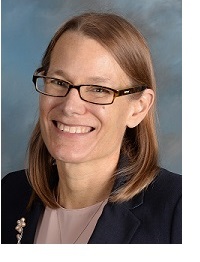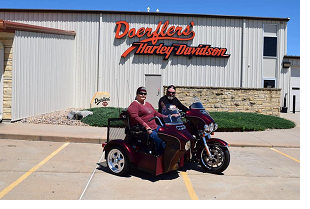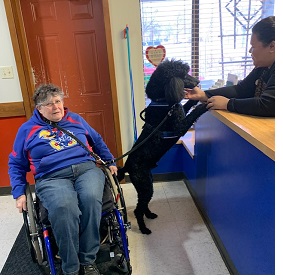
Kansas Disability and Health Program News
Spring 2020
In this Issue:
- Greetings from the Director
- Kansas DHP and Oral Health Kansas Partner to Deliver “Feeling Good About Your Smile”
- DHP to Participate in National Social Media Campaign
- Consumer Advisory Board Member Profile: Lou Ann Kibbee
- CHEC Assessments of Veterinary Facilities a Success
- Kansas DHP to Implement Workout On Wheels, internet intervention
- Presentations
- Publications
Greetings from the Director
 Hello from the Kansas DHP! We hope everyone is managing in this new age of social distancing. The COVID-19 pandemic reminds us that people with disabilities have long been disproportionately affected when resources are limited, making information about emergency preparedness and staying healthy particularly relevant. We invite you to review the emergency preparedness resources on the Research and Training Center on Independet Living (RTC/IL) website. You can also visit the Kansas DHP website and follow Kansas DHP on Facebook for more information about staying healthy while practicing social distancing. Now more than ever, it is critical to maintain good health habits and stay connected and supported.
Hello from the Kansas DHP! We hope everyone is managing in this new age of social distancing. The COVID-19 pandemic reminds us that people with disabilities have long been disproportionately affected when resources are limited, making information about emergency preparedness and staying healthy particularly relevant. We invite you to review the emergency preparedness resources on the Research and Training Center on Independet Living (RTC/IL) website. You can also visit the Kansas DHP website and follow Kansas DHP on Facebook for more information about staying healthy while practicing social distancing. Now more than ever, it is critical to maintain good health habits and stay connected and supported.
Throughout these unusual times, we will continue our work to promote the health of Kansans with disabilities. In this newsletter, you will find updates on our ongoing projects, such as “Feeling Good About Your Smile,” and information about developing projects, such as a national social media campaign on diabetes care for people with intellectual disabilities and a new, internet-based exercise intervention for people with mobility disabilities.
Yours in good health,
Jean P. Hall, Director
Kansas Disability and Health Program
Kansas DHP and Oral Health Kansas Partner to Deliver “Feeling Good About Your Smile”
“Feeling Good About Your Smile” is a 90 minute oral health learning session for people with intellectual disabilities. The intervention was developed in partnership with Kathy Hunt, a registered dental hygienist at Oral Health Kansas (OHK), and teaches daily oral hygiene, healthy food choices, and eating habits that promote good oral health. Drawing upon published research on teaching good oral health practices, the learning session uses skill development and visual learning cues. The learning sessions are delivered on-site by trained facilitators at community developmental disability organizations or other community providers. Since May 2017, 14 learning sessions have been delivered in 9 Kansas cities/towns. 160 people, comprising 125 people with IDD and 35 support staff, have participated in the learning sessions.
DHP to Participate in National Social Media Campaign
 Kansas DHP will participate in the social media campaign “DHP Public Service Announcement for Managing Diabetes for People with IDD” in April and May. The campaign, which presents videos about diabetes management and care for people with intellectual disabilities, was created by the South Carolina Disability and Health Project with funding from the CDC. Kansas DHP and disability and health programs in nine other states hosted listening sessions with adults with IDD and type 2 diabetes to help develop the videos. The videos will be posted to the social media outlets of disability and health programs nationwide. To see the videos, “like” Kansas DHP’s Facebook page, or follow #DisabilityandDiabetes.
Kansas DHP will participate in the social media campaign “DHP Public Service Announcement for Managing Diabetes for People with IDD” in April and May. The campaign, which presents videos about diabetes management and care for people with intellectual disabilities, was created by the South Carolina Disability and Health Project with funding from the CDC. Kansas DHP and disability and health programs in nine other states hosted listening sessions with adults with IDD and type 2 diabetes to help develop the videos. The videos will be posted to the social media outlets of disability and health programs nationwide. To see the videos, “like” Kansas DHP’s Facebook page, or follow #DisabilityandDiabetes.
Consumer Advisory Board Member Profile: Lou Ann Kibbee
 “Independent Living is Freedom through Choice,” says the tattoo across the back of Lou Ann Kibbee. And her work to promote independence for Kansans with disabilities spans decades as an advocate and longtime employee of Southeast Kansas Independent Living (SKIL) and Living Independently in Northwest Kansas (LINK).
“Independent Living is Freedom through Choice,” says the tattoo across the back of Lou Ann Kibbee. And her work to promote independence for Kansans with disabilities spans decades as an advocate and longtime employee of Southeast Kansas Independent Living (SKIL) and Living Independently in Northwest Kansas (LINK).
Kibbee’s story begins in Ellis, Kansas as the second youngest of nine children. Her father farmed, but the family lived in town, so between her seven brothers, her sister, and the neighborhood kids, she had plenty of playmates. She enjoyed riding her horses, Babe and Smokey, along Big Creek. At the age of 14, she was proud to “inherit” a 1964 Ford Galaxie 500 from her three older brothers. At 16, she “fell in love all over” with the 1969 Ford Fairlane she received from her dad.
During her senior year of high school, Kibbee sustained a spinal cord injury in a car accident while on her way home from visiting friends in nearby Hays. The injury resulted in eight months of hospitalization and quadriplegia. With the help of two tutors, she was able to continue high school while in the hospital and graduate with the rest of her class.
In 1977, she started classes at Emporia State University, where she planned to major in Special Education. “My brother Tim, just a year older than me, had an intellectual/developmental disability. Growing up with Tim, I thought that I could make a difference in educating students with disabilities,” Kibbee says. Her work in advocacy began at Emporia State University, where she became involved with the Handicapped Student Association and eventually became its secretary. In 1982, she reenrolled in university, this time at Fort Hays State, where she founded the Disabled Students Association and “made a great deal of improvements through the years.” In 1983, she was elected to LINK’s board of directors; in the 1990’s, she was facilitating ADA compliance under LINK’s auspices.
As Systems Advocacy Manager for SKIL, she monitors policy changes and distributes national advocacy information across the state from her home office in Hays. Her advocacy work also includes service on the boards of the Statewide Independent Living Council of Kansas, the National Council on Independent Living, and the Kansas Disability Caucus Committee/Board. Though her brother, Tim, passed away in 2008, she also had the “privilege” of advocating for him with two of her other siblings.
“If you want to be a part of making real change for millions of people, getting involved in the disability movement is the way to do it, whether local, state, or national,” Kibbee says. “Do not ever think that you cannot make a difference,” she adds. “A good advocate must be passionate, committed, and persistent. When I got involved with the Handicapped Students Association at Emporia State University in 1977, I know most definitely that I had no idea that disability rights and systems advocacy would play such an enormous role in my life. At the time we were just trying get our campus more accessible. Now for over 40 years, this has been my passion to make change happen. We have had a lot of success in making change, but there is still so much needed to be done. So much was needed to free our people to be able to live a life of inclusion, choice, nondiscrimination, and freedom.”
Kibbee became involved in Kansas Disability and Health Consumer Advisory Board (CAB) to learn more about research, and she says she’s excited to be learning new things and changing habits. “I find it a process that takes time,” she says. “I am excited to hear about the new physical fitness program coming up soon. I enjoy spending time with the other members of the Consumer Advisory Board and the KU team.” She recently shared her experiences alongside Kansas DHP researcher Dot Nary and another CAB member in a presentation to health care professionals through the KUMC Area Health Education Center.
“I think it is so important for healthcare providers to be educated about how to treat and respect all people with disabilities, but also to not make judgements or assumptions about us,” she says of the experience. “They should certainly not assume we do not have a good quality of life just because we have a disability. I believe there are many healthcare providers whose intentions are good but there are some that feel we do not have the ability to make decisions or choices on our own behalf. We all have the right to make informed decisions like anyone else.”
In her free time, Kibbee has seen her love for horses and cars transform into an interest in motorcycling. She enjoys riding in a sidecar custom built by her husband of 24 years, Larry, who has also modified a 2003 Harley Davidson 100th Anniversary Electra Glide to build a trike Lou Ann can “wheel up into and ride independently. I have my restricted license and am still learning but I love to ride.” She and Larry have four children, three grandchildren, and two dogs.
CHEC Assessments of Veterinary Facilities a Success
 The Community Health Environment Checklist (CHEC) is a tool for measuring the usability of spaces for people with disabilities. It was developed by people with disabilities and disability researchers at Washington University in St. Louis, Missouri.
The Community Health Environment Checklist (CHEC) is a tool for measuring the usability of spaces for people with disabilities. It was developed by people with disabilities and disability researchers at Washington University in St. Louis, Missouri.
Since 2017, the Kansas DHP has facilitated CHEC assessments of usability for people with mobility-related disabilities at health departments, fitness facilities, and clinics for medical, behavioral, dental, and ocular health. In 2019, the DHP partnered with researchers at the Kansas State University (KSU) College of Veterinary Medicine to conduct a survey on Kansas veterinarians’ understanding of usability and accessibility principles and to complete CHEC assessments of 10 veterinary hospitals. Dr. Kate KuKanich, KSU faculty, and Emma Winkley, a dual DVM/MPH degree student who pursued the project as part of her MPH, contributed extensively to this work.
The collaboration culminated in a journal article titled “Improving Accessibility for Veterinary Clients with Mobility-Related Disabilities,” which was published in the February 2020 issue of the Journal of the American Veterinary Medical Association (JAVMA). The team also presented its findings at a statewide veterinary conference and at the Kansas Public Health Association annual conference. Dr. Kate KuKanich, a faculty member from the KSU College of Veterinary Medicine who worked on the project, successfully added the topic of veterinary hospital accessibility to KSU’s veterinary medicine curriculum.
The collaboration was successful in raising current and future veterinarians’ awareness of the importance of accessibility. To learn more about the CHEC or schedule an assessment, contact Kim Bruns at kbruns@ku.edu.
Kansas DHP to Implement Workout On Wheels, internet intervention
Kansas DHP will begin implementation of the Workout On Wheels, internet intervention (WOWii) in 2020 in partnership with researchers at the Baylor Scott and White Research Institute. WOWii promotes increased physical activity for people with mobility disabilities through 16 virtual weekly meetings with peer support. Participants will be provided with exercise equipment and compensated for their time. Registration information will be coming soon; check the Kansas DHP website or follow Kansas DHP on Facebook for updates.
Presentations
DHP staff members present on various topics at state and national conferences. If you are interested in learning more about any of the topics mentioned above or below, or you would like us to present at your organization, please contact us. These are the recent presentations:
- December 9th - Kansas City University of Medicine and Bioscience medical students—"People with Disabilities, Quality of Life, and of End-of-Life Decisions”
- December 10th - Kansas Developmental Disabilities Nurses Association—"Eliminating Disability-Related Health Disparities for Kansans”
- December 12th - InterHab Members – “Feeling Good about Your Smile: An oral health intervention for people with I/DD”
- January 16th - KU Life Span Institute Collaboratory (poster title) – “National Survey on Health and Disability – A longitudinal study”
- January 16th - KU Life Span Institute Collaboratory (poster title) - "Stoplight Healthy Living: Translating Research into Practice”
- February 13th - The Mission Project, “Improving Health for People with Disabilities: Addressing Health Disparities for Kansans with Intellectual/Developmental Disabilities and/or Mobility Impairments”
- February 14th - Johnson County Developmental Supports, “Self-Advocacy in Health Care for People with Disabilities: Sharing Tips and Ideas”
- February 27th - American Association on Intellectual and Developmental Disabilities, “Health Disparities Experienced by People with ID and Those with Other Disabilities"
- March 10th - Center for Disease Control and Prevention, “Stoplight Healthy Living: Challenges and Successes in Promoting Healthy Choices for Adults with IDD”
Publications
Jean P. Hall, Katie Batza, Carl G. Streed Jr., Brian A. Boyd, and Noelle Kurth published “Health Disparities Among Sexual and Gender Minorities with Autism Spectrum Disorder” in the Journal of Autism and Developmental Disorders.
Like Us on Facebook
 Join us in conversation on the Kansas DHP Facebook page. We share tips related to a healthy lifestyle, focusing on physical activity, oral health and nutrition.
Join us in conversation on the Kansas DHP Facebook page. We share tips related to a healthy lifestyle, focusing on physical activity, oral health and nutrition.
For More Information
Kim Bruns, DHP Program Coordinator
kbruns@ku.edu
The University of Kansas
Institute for Health and Disability Policy Studies
1000 Sunnyside Ave.
Lawrence, KS 66045
This newsletter was supported by Grant/Cooperative Agreement Number DD000006 from CDC National Center on Birth Defects and Developmental Disabilities, Disability and Health Branch. Its contents are solely the responsibility of the authors and do not necessarily represent the official views of CDC, NCBDDD, Disability and Health Branch.